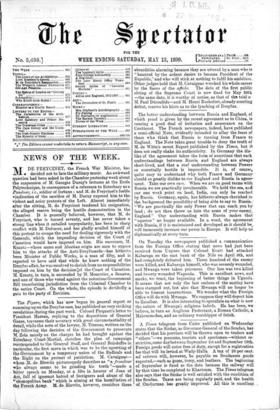The Figaro,' which has' now begun its general report or
summing-up on the Dreyfus case, has published no very striking revelations during the past week. Colonel Picquart's letter to President Mazeau, replying to the depositions of General Gonse, traverses their accuracy with great circumstantiality of detail, while the note of the lawyer, M. Tezenas, written on the day following the decision of the Government to prosecute M. Zola merely on the charges he had brought against the Esterhazy Court-Martial, sketches the plan of campaign recommended to the General Staff, and General Boisdeffre in particular, the first, move in which was to be the upsetting of the Government by a temporary union of the Radicals and the- Right on the pretext of patriotism. M. Cavaignac- whom M. de Blowitz picturesquely describes as "a, frondeur wiio always seems to be grinding his teeth "—made a bitter ' speech on Monday, at a fete in honour of Joan of full of ignorant hatred of foreigners and abuse of the "C6smopolitan bank " which is aiming at the .humiliation of the. French Army Kde Blowitz however, considers these absurdities alarming because they are uttered by a man who is "haunted by the ardent desire to become President of the Republic," and who will stick at nothing to fulfil his ambition. Other judges hold that M. Cavaignac wrecked his whole career by the fiasco of the affleke. The date of the first public sitting of the Supreme Court is now fixed for May 29th --the same date, it is worthy of notice, as that of the trial o M. Paul Deroulede—and M. Henri Rochefort, already scenting defeat, renews his hints as to the lynching of Dreyfus.






































